Research and conservation of marine megafauna in Australia and beyond
The Marine Megafauna group is dedicated to the research and conservation of charismatic marine megafauna and comprises the Whales and Dolphins research team, Shark Ecology, and the Southern Oceans Persistent Organic Pollutants Program.
Our impact
Back from the brink - Scalloped Hammerhead Shark
Natura Pacific visits Moreton Bay with Griffith University's Dr Johan Gustafson to learn about the plight of the Scalloped Hammerhead Shark.
Primary researchers
Lead: Whales and Dolphins
Whale ecology
Research Fellow: Whales and Dolphins
Ecosystem modelling
Laure Torre
Adjunct Researcher: Whales and Dolphins
Whale ecology
Dr Johan Gustafson
Lead: Shark Ecology
Sharks, Rays, Fish
Dr Serena Lee
Research Fellow: Whales and Dolphins
Oceanography, Numerical modelling
Hilla Kela
Research and Project Assistant: Whales and Dolphins
Data management
Associate Professor Susan Bengston-Nash
Lead: Southern Oceans Persistent Organic Pollutants Program
Ecotoxicology, Whale biology, Environmental monitoring
Dr Mariel Familiar Lopez
Research Fellow: Shark Ecology
Sharks, Rays, Fish
Sarah McCulloch
PhD candidate: Whales and Dolphins
Thesis: Supplementary feeding patterns of east Australian humpback whales on their southern migration
Our expertise
- Species distribution modelling
- Climate change impacts
- Marine mammal monitoring
- Big-data analysis
- Marine mammal tagging
- Animal movement and behaviour
Research themes
Whales and Dolphins
Our Whales and Dolphins research team focus on extending knowledge about the feeding, migration and habitat use of marina mammals, as well as human impacts on whales and dolphins in coastal waters.
Our independent science is applied to new management strategies for better conservation and protection of marine mammals in urbanised coastal waters.
We develop research and education on a regional and international level, in association with partners from South Africa, New Zealand, New Caledonia, Mexico, Argentina, Ecuador, Brazil, Panama, Germany and the US.
Shark Ecology
The Shark Ecology team conduct research on shark behaviour in support of improved management, conservation and education outcomes.
As human populations and water activities grow, the study of shark behaviour and habitat use is crucial to understanding how people and sharks interact and can mutually co-exist.
Queensland is home to many species of shark and the team utilise many tracking technologies to research shark movement, including satellite and acoustic tagging and advanced biologging tags to produce fine-scale behavioural data.
Southern Oceans Persistent Organic Pollutants Program
The Southern Ocean Persistent Organic Pollutants Program (SOPOPP) undertakes several interrelated projects focusing on manmade threats to polar biota and ecosystems.
SOPOPP’s marine megafauna-related projects include:
- Tracking the distribution and abundance of humpback whales in Moreton Bay
- The Antarctic Humpback Whale Sentinel Program.
Research projects
Whales and climate research program
This international research project establishes a fundamental understanding of how changing ocean conditions are influencing the recovery of humpback whale populations and develops adaptation scenarios for advancing whale conservation, policies and programs. Our work also lays the path for future research on other baleen species.
The research program runs under four major themes:
- whale ecology
- ocean processes
- marine geochemistry
- future climate.
Funding sources
Private philanthropic trust
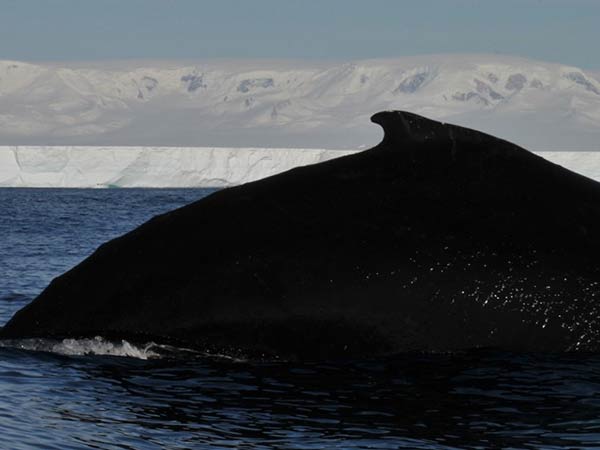
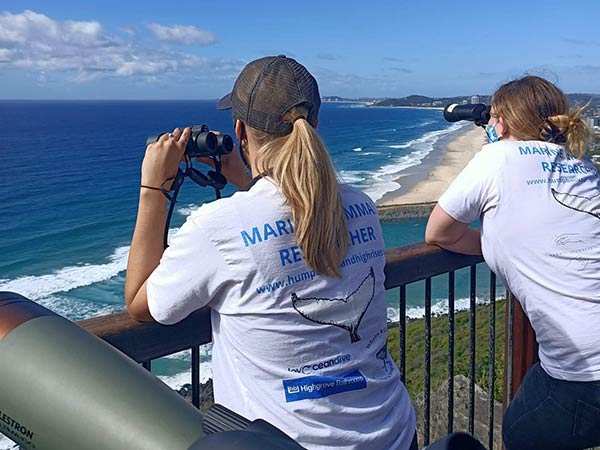
Marine mammal monitoring SEQ
Many whale and dolphin species utilise South East Queensland waters. Monitoring their distribution, movement and habitat requirements over time is essential to detecting population changes and discovering new behaviours.
The centre works with Humpbacks and High-rises ( HHR ) a non-profit community organisation that’s conducted a long-term whale monitoring program since 2011 and training the community to participate in a standardised, systematic surveys of humpback whales off Queensland.
Boat and land-based surveys are also conducted each year throughout whale migration, gathering data on the date, time, location, species and number of marine mammals sighted, along with detailed behavioural information.
Funding sources
Humpbacks and High-rises
Newborn humpback whale study
This project investigates newborn humpback whale calves sighted on the Gold Coast. The research is focused on defining age classes, preferred fine-scale habitat use and interaction with vessels. The research also aims to determine the size, fitness and residence time of the calves.
Funding sources
Sea World Cruises
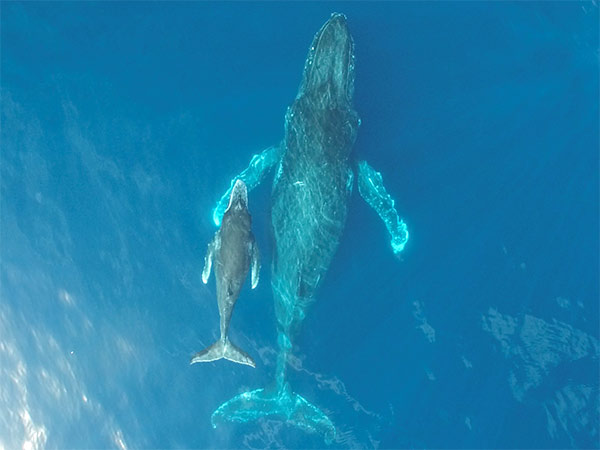
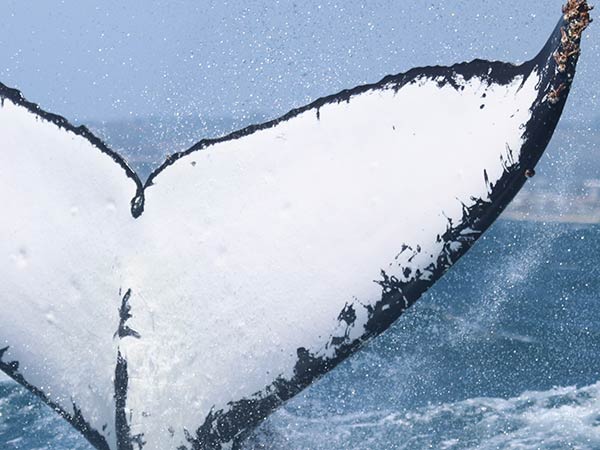
Fluke identification catalogue
Flukes, or whale tails, bear unique patterns that allow identification of individual animals and provide life history information.
This project creates a fluke database for humpback whales sighted on the Gold Coast and Sunshine Coast as part of the Humpbacks and High-rises citizen science program. With the help of artificial intelligence, large numbers of fluke images can be crosschecked with databases to provide instant matching results.
Funding sources
Humpbacks and High-rises
The future of the whale watching industry
Whale watching is major tourism industry, valued at over $2 billion worldwide. The industry is particularly important on the east coast of Australia, where one of the most popular species—the humpback whale (Megaptera novaeangliae)—migrates each year between their breeding and feeding grounds.
This project assesses the value and importance of the whale watching industry in a regional, national and global socio-economic context. Future impacts of climate change are addressed, with strategies developed to overcome future challenges. Research undertaken includes passenger surveys, stakeholder workshops and modelling.
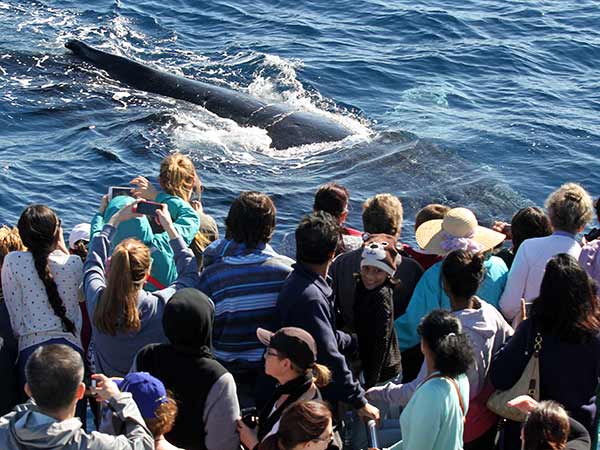
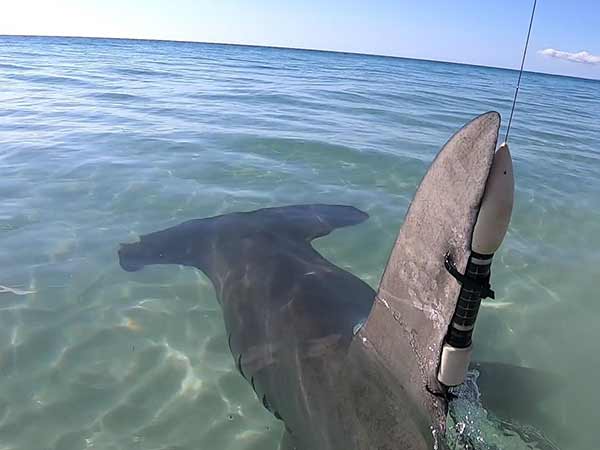
Hammerhead shark movement in Queensland
Relatively little is known about the movement of great (Sphyrna mokarran) and scalloped (Sphyrna lewini) hammerhead sharks (Sphyrna lewini) in Queensland waters.
In partnership with the University of the Sunshine Coast and the Queensland Department of Fisheries, this project seeks to tag hammerhead sharks with satellite, acoustic and biologging tags to unveil their lives beneath the surface.
Funding sources
Department of Agriculture and Fisheries, University of the Sunshine Coast, Sunshine Coast Council
Juvenile hammerhead movement study
Juvenile hammerhead sharks are pupped in estuarine waters, where they stay for several years before venturing into coastal waters.
This project utilises tagging and modelling technologies to determine critical habitats, behaviours and movement patterns. Results of the study will further support conservation and shark management policies.
Funding sources
Department of Agriculture and Fisheries, Cities Research Institute
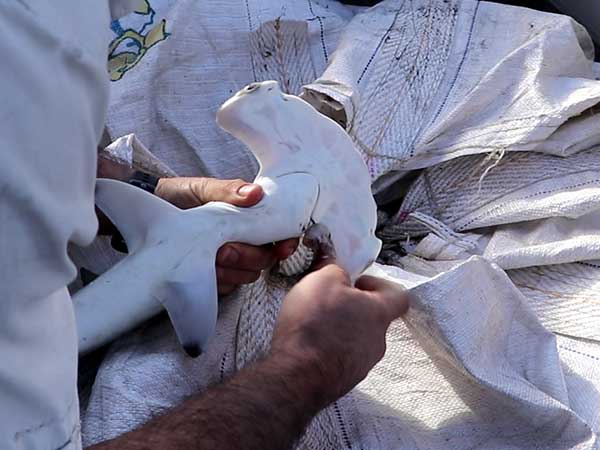
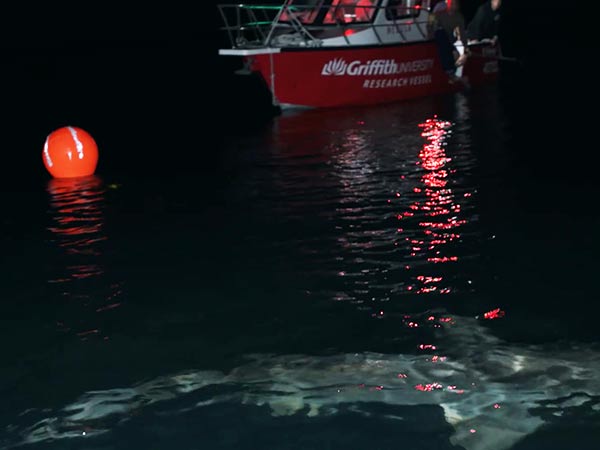
Urban bull shark project
Bull sharks present through most of their lifecycles near urbanised coastlines, including estuarine and near-coastal habitats.
Pressures on bull shark populations include habitat destruction, modification to nursery areas and increased human-shark interactions.
Our urban bull shark project aims to study bull shark behavioral changes alongside increased human activity.
Funding sources
Queensland local and state governments, Cities Research Institute
Large shark movement SEQ
Southeast Queensland connects with the Pacific Ocean through a complex estuarine system, and is home to many coastal and pelagic shark species including hammerhead, white and tiger sharks.
This project uses various tracking technologies and partnerships to help understand how these sharks use the local areas.
Funding sources
Queensland local and state governments
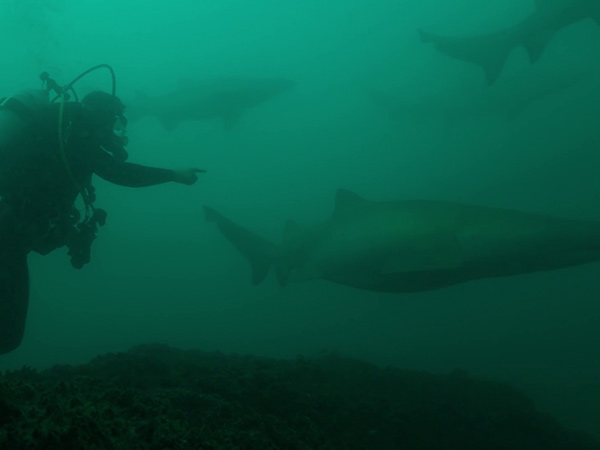
Partnerships
Sea World Cruises, the largest whale watching company on the Gold Coast, supports marine mammal monitoring and research on the whale watching industry.
The Whales and Climate Change Program comprises a multidisciplinary team from Australia, South Africa and South America, dedicated to understanding the present and future of whale populations in relation to climate change.
Humpbacks and High-rises is a Gold Coast-based non-profit dedicated to the research and protection of marine mammals in southeast Queensland.
Contact details
- Phone
- (07) 5552 7269
- Location and postal address
- Coastal and Marine Research Centre
- Room 2.01, Building G51
- Griffith University
- Gold Coast, Queensland, 4222